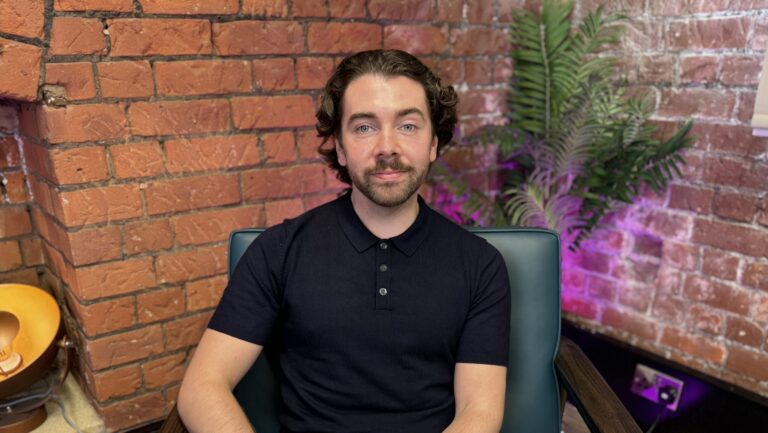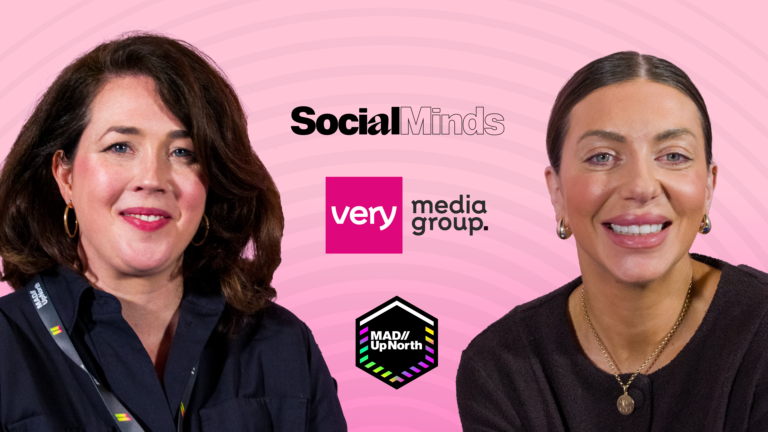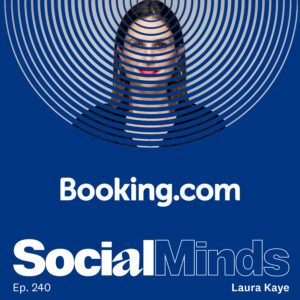How Booking.com turns search trends into TikTok travel tips
Whether you’re a customer or you’ve seen the star-studded TV spots, you’ll know Booking.com is far and away from the underdog in the travel industry. In fact, it’s been the market’s leading online travel agency for some time now. This might prompt the question, why does a brand this well-known need social to stay top-of-mind for holidaymakers?
The fact is, Booking.com isn’t the only online travel agency out there. In a marketplace where travellers are inundated by choice when planning a trip, Booking.com’s primary goal for its social channels is simply to be distinctive.
That’s a lot harder than it sounds, which is why global social media director Laura Kaye joined the SocialMinds podcast to tell us more.
Social Media Marketing 101
As every good marketer knows, your social content strategy should strike a balance between conveying your brand’s necessary messaging and showing up on social like a human being. “You need to find a version of your content that resonates with people, but also tells a story and markets your products,” she says. “That’s the sweet spot every social media marketer should aspire to.”
“TikTok is now surpassing Google as Gen Z’s preferred search engine. That means when Gen Z wants to travel somewhere, their planning starts with the TikTok search bar. We want to appear in those results.”
And above all else, your content should entertain – because, aside from catching up with friends, that’s what people want out of their social experience. Booking.com’s original content series serve the purpose of being entertaining while differentiating the brand in a crowded market – a key goal for the social team.
But what guides the creative? Booking.com lets the data do the talking. Its insights across Meta and TikTok showed itineraries were popular in search trends for travel. So that became the focus of one of their owned content series, with a twist: a 15-minute itinerary. The social team test these a few times to continue making more of what users find most engaging, and shelving what they don’t.
@bookingcom *Not possible when wearing clogs* #amsterdam #travel #traveltok ♬ som original – 🦕
By collaborating with local influencers and seamlessly integrating its own bookable attractions from bike hires to excursions, Booking.com positions itself organically in users’ travel searches. And it’s working. Booking.com has seen a 2.5x increase in engagement rate year-on-year. Yes, Booking.com could post UGC of a beach in Ko Samui and watch the likes roll in – but that won’t win the brand any prizes for standing out.
Working hard or hardly working
It’s not just its content series that have been given the Booking.com ‘test and learn’ treatment.
Influencer marketing has been a hot topic in the industry for some time now, but Laura has some sage words for those who think a campaign isn’t worth its salt without a creator or two: “Influencers are a great tool…but they’re not great for everything. Just like a radio ad doesn’t solve all your problems, working with influencers isn’t going to solve all your problems either.”
“Influencers are a great tool…but they’re not great for everything. Just like a radio ad doesn’t solve all your problems, working with influencers isn’t going to solve all your problems either.”
At the end of the day, influencer marketing is a paid media outlet – and it makes sense to have your paid media outlets to work as hard as possible for your budget. For Booking.com, that means partnering with creators on a steady stream of drumbeat content. Large-scale multi-partner activations, not so much – there’s too many parties involved for the brand’s messaging to stick.
@bookingcom Why just celebrate Pride in June when you can #TravelProud all year round? Kicking off with our top LGBTQ+ travelers picks for an inclusive city getaway. Have you ever been to any of these cities? #pride2023🏳️🌈 ♬ original sound – 🙂
Laura also stresses the importance of working with influencers to convey your brand’s message in ways that you can’t do successfully alone. Booking.com’s mission is to create a stress-free booking experience by showing that everyone can experience the world, no matter if you’re a family with 11 kids or a solo traveller with 11 dogs. “It’s difficult for us to show how Booking.com accommodates travellers with any kind of niche needs as a brand on our own. Working with influencers who can relate or have experience with these needs gives our content authenticity.”
Ted talk
And what about Ted Lasso, the loveable, optimistic football coach that serves as the inspiration for Booking.com’s brand tone of voice (TOV)?
Landing on Ted Lasso, Laura explains, was the result of both market research on brand perceptions and a desire to zig where every other brand tov was zagging to the tune of the witty, cool millennial character on social.
“People said that if Booking.com was a person, he’d be a guy in a suit. We decided to lean into that,” says Laura. “Ted Lasso has guided our TOV work on a global level, but not everyone is familiar with the character. So we’ve been working closely with our local teams to make our persona closer to whoever the Ted Lasso equivalent is in that region.”

Crafting a consistent TOV is a challenge that transcends the walls of social, where users are hit with your content from all sides: paid ads, organic posts, influencer partnerships. It’s a lot for brands to contend with. But as Laura says, it’s not a bad thing in itself. Just make sure your core message stays the same. How you deliver it? That’s its own beast.
“The big opportunity for a strong tone of voice is not just in post copy or your content, but in your replies to comments, especially on TikTok. Comments are so important. Everyone races to the comments.”
“Five years ago, social marketers were grappling with making Instagram content native while also keeping it on-brand. Then along came TikTok and everything went out the door!” Laura laughs. “Podcasts could be the next TikTok, then brands would have to pivot to audio. It’s always evolving. That’s the fun part of the job.”
Think like Booking.com for a search-friendly social strategy:
- Stating the obvious, but: reply to comments. Anywhere you share content online is a chance to build a consistent TOV.
- Build a content strategy around insights. Use industry-specific search data and your own analytics to create videos your audience is searching for.
- Researching and including keywords in your TikTok titles, descriptions, hashtags and the video script (spoken keywords rank higher in search results) will improve that all-important TikTok SEO.
- Negative reviews will be around for as long as you have customers. It’s how you deal with them that matters.
- Treat influencer marketing like a form of A/B testing. Switch up the messaging across campaigns to determine where creators provide the best return on ad spend.
- Your brand persona might not be a globally recognised one. Work closely with your regional teams to tailor your TOV to a local equivalent to retain relatability.
- Market research on brand perceptions can guide your TOV. Do you want to give people what they expect – or flip the script?






